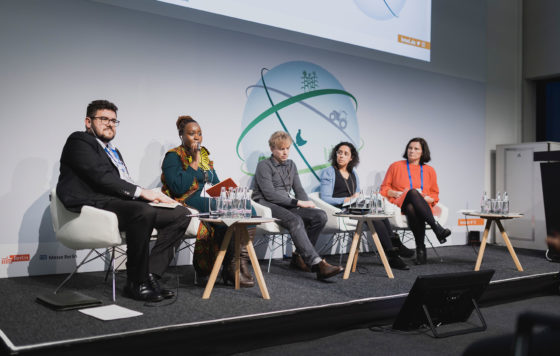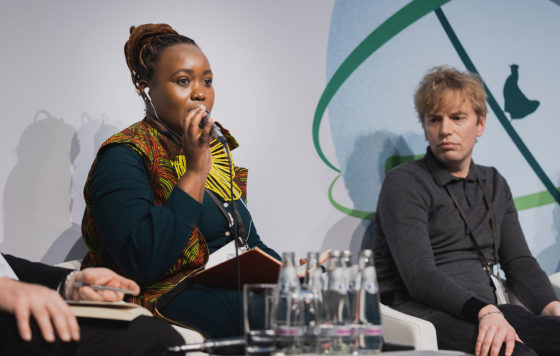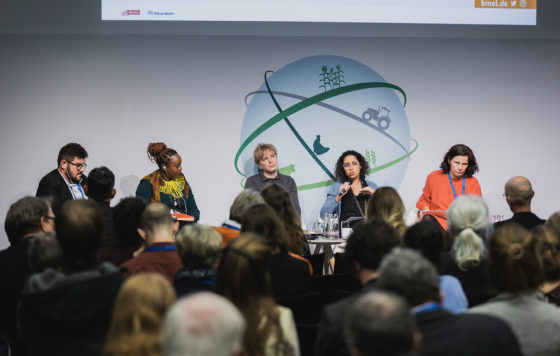Creating resilient food systems – with replies from those affected by the crisis!
German NGO Forum on Environment and Development
INKOTA-network e.V.
MISEREOR
FIAN Germany
Bread for the World
Time: Thursday, 19. January 2023, 4:00 p.m. – 5:30 p.m.
Room: M6-M7
Languages: English, German
Summary:
Moderator Stig Tanzmann (Bread for the World) opened the panel with introductory remarks on the hunger crisis, the climate and biodiversity crisis, and the crisis of multilateralism. The first panelist, Sefu Sunni, Kenyan coordinator of the Civil Society and Indigenous Peoples Mechanism (CSIPM) for relations with the UN Committee on World Food Security (CFS), then presented the results of the CSIPM consultation process regarding the food crisis and criticized the Global Alliance for Food Security for not representing many people and not explicitly enshrining the Right to Food. She also denounced the dependence on industrial food systems and argued for better recognition of the participatory rights of women, indigenous groups and young people. In her input, Brazilian professor Veruska Prado substantiated the description of the hunger situation of many people in the global South using the example of Brazil. At the same time she expressed hope through first countermeasures of the new government Lula. Professor Antionio Andrioli, also from Brazil, reported on positive approaches “from below” and successful agroecologically oriented universities in the South American country. Finally, Dr. Silke Bollmohr from Inkota once again emphasized the importance of civil society on a global level and the need to combat the use of chemical pesticides and fertilizers. Small farmers produce 70-80% of the world’s food – their voices must be taken seriously. In his keynote speech, Michael Fakhri, UN Special Rapporteur on the Right to Food, also advocated holistic, agro-ecological approaches. Together with more than 100 participants, the panel discussed further important approaches.
Background information:
- Andrioli, Antônio Inácio and Antunes, Ricardo Favaretto: Food inequalities
in Argentina and Brazil. A Dilemma of our Time. CSS Working Paper Series
No 8, Hamburg, https://doi.org/10.25592/css-wp-008. - MISEREOR, FIAN, INKOTA-netzwerk, Oxfam und Brot für die Welt, 2020: Positionspapier Welternährung 2030 – 11 Schritte für eine Zukunft gegen Hunger, https://www.forumue.de/welternaehrung-2030-11-schritte-fuer-eine-zukunft-ohne-hunger/.
- Civil Society and Indigenous Peoples’ Mechanism (CSIPM) for relations with the UN Committee on World Food Security (CFS), 2022: Voices from the ground 2: transformative
solutions to the global systemic food crises, https://www.csm4cfs.org/voices-from-the-ground-transformative-solutions-to-the-global-systemic-food-crises/. - INKOTA-netzwerk,2022: Goldkugel oder Krisenverstärker? Neue Abhängigkeiten von synthetischen Düngemitteln und ihre Folgen für den afrikanischen Kontinent, https://www.inkota.de/presse/pressemitteilungen/abhaengigkeit-von-kunstduenger-verstaerkt-welternaehrungskrise.
- PENSSAN Network, 2022: Food Insecurity and Covid-19 in Brazil. National Survey on Food
Insecurity in the Context of the Covid-19 Pandemic in Brazil, https://olheparaafome.com.br/wp-content/uploads/2022/09/OLHESumExecutivoINGLES-Diagramacao-v2-R01-02-09-20224212.pdf. - EVENT SERIES Governance of Food Systems Transformation, https://assets.ctfassets.net/rrirl83ijfda/1uDqisDcolvYGOp41yNmTS/a313b680f5fa91d0242379628fa1cb67/Event_Series_Conclusions.pdf
Keynote Speaker
Panel Guests








